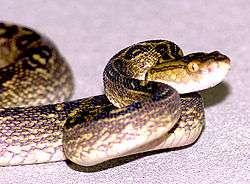波布
Japanese

波布 (habu): the habu pit viper.
| Kanji in this term | |
|---|---|
| 波 | 布 |
| は Grade: 3 |
ふ > ぶ Grade: 5 |
| on’yomi | |
Etymology
Various theories exist.
- Possibly an alteration from 反鼻 (hanbi), an obsolete term for a kind of Chinese medicine made from the skin and/or organs of certain venomous snakes.
- More likely, may be an alteration from 蛇 (hebi, “snake”). Some dialects distinguish between non-poisonous hebi and poisonous habi.
- Possibly also related to, or influenced by, Old Japanese-derived verb 食む (hamu, “to bite”). An /m/ - /b/ alternation can be found in some Japanese words, so a shift from hamu to habu is a reasonable possibility. The standard modern Japanese word hebi for “snake” may similarly be derived from, or have been influenced by, hamu “to bite”.
The kanji spelling 波布 is an example of ateji, with the characters chosen purely for their phonetic values.
Noun
波布 (hiragana はぶ, katakana ハブ, rōmaji habu)
- Trimeresurus flavoviridis (syn. Protobothrops flavoviridis), a species of venomous pit viper native to Okinawa
Usage notes
As with many terms that name organisms, this term is often spelled in katakana, especially in biological contexts, as ハブ.
Derived terms
Derived terms
- 本波布 (honhabu): the “real” or “true” habu
- ハブ属 (habuzoku): the genus Protobothrops
- 波布草 (habusō): Senna occidentalis, also called coffee senna or coffeeweed, a wide-ranging tropical plant with seeds sometimes used for a beverage similar to coffee
- 波布茶 (habucha): a beverage made by roasting senna seeds and steeping in water
Descendants
- English: habu
Miyako
Alternative forms
Okinawan
Alternative forms
This article is issued from
Wiktionary.
The text is licensed under Creative
Commons - Attribution - Sharealike.
Additional terms may apply for the media files.